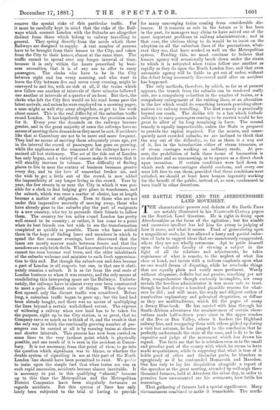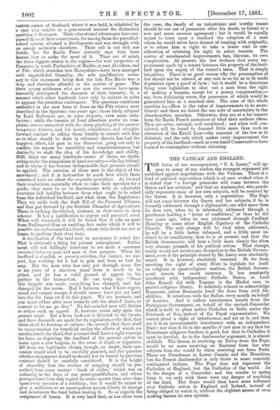SIR BARTLE FRERE AND THE ABERDEENSHIRE LAND MOVEMENT.
rrHE characteristic powers and defects of Sir Bartle Frere are notably illustrated in his Nineteenth-Century papers on the Scottish Land Question. He is right in fixing upon
Aberdeenshire as the focus of the agitation ; but his nimble and excursive intellect has led him far astray in judging of
how it arose, and what it means. Fond of generalising upon a magnificent scale, he has allowed a hasty and partial induc- tion of facts to suggest ideas that are monstrously exaggerated, where they are not wholly erroneous. Apt to pride himself upon the valuable faculty of viewing a subject in the light of all its relations and adjustments, he takes cognisance of what is remote, to the neglect of what lies close at hand, and insists with a tedious emphasis upon what no one would dream of disputing, while he overlooks things that are equally plain and vastly more pertinent. Wordy without eloquence, definite but not precise, searching yet not deep, comprehensive though curiously incomplete, his essay reveals the heedless administrator it was never safe to trust, though he had always a hundred plausible reasons for what- ever he did ; and still more, the ready and diligent author of numberless explanatory and polemical despatches, as diffuse as they are multitudinous, which fill the pages of many a dreary Blue-book. He has carried with him through his South-African adventures the reminiscences of certain obser- vations made half-a-dozen years since in the upper reaches of the Dee or Don Valley, where it borders the Highland railway line, and comparing them with others picked up during a visit last autumn, he has jumped to the conclusion that he perfectly understands the state of the case, and is fit to be the expositor and judge of the movement which has drawn his regard. The facts are that he is mistaken even as to the small and peculiar part of the county with which he seems to have made acquaintance, while in supposing that what is true of it holds good of other and dissimilar parts, he blunders as egregiously as if he confounded Monmouth and Macedon. One has only to lay his disquisition alongside a report of the speeches at the great meeting, attended by well-nigh three thousand farmers, held at Aberdeen the other day, in order to perceive how unwarranted are his averments, how futile his reasonings. That gathering of farmers had a special significance. Many circumstances combined to make it remarkable. The north- eastern corner of Scotland, where it was held, is inhabited by a race who exhibit in a pronounced manner the distinctive qualities of Scotsmen. Their educational advantages have sur- passed those of their countrymen, for among them the parochial- school system attained a development and was wrought with an energy unknown elsewhere. Their soil is not rich nor fertile, but Sir Bartle Frere correctly says they have known how to make the most of it. Time out of mind, the three biggest estates in the region—the vast properties of Panmure, in north Forfarshire, of Haddo, in east Aberdeen, and of Fife, which stretches into Morayshire—have been managed with unparalleled liberality, the sole qualification neces- sary to this statement being that the late Fox Maule was a deep and obstinate offender in the matter of game. The three young noblemen who are now the owners have spon- taneously anticipated the demands of their tenantry, in a manner which other landlords have only to imitate in order to appease the prevalent excitement. The generous conditions embodied in the new form of lease on the Fife estates were described in the Spectator two years ago ; those lately adopted by Lord Dalhousie are, in some respects, even more satis- factory ; while the tenants of Lord Aberdeen prefer no com- plaint, save as connected with the sharp pinching of the present temporary distress, and his manly, considerate, and straight- forward conduct in asking them frankly to consult with him as to what should be done in reference thereto has had the happiest effect, his part in the discussion going not only to confirm his repute for amiability and conscientiousness, but distinctly to exalt the idea of his knowledge and ability. Still, there are many landlords—some of them, no doubt, acting under the compulsion of hard necessity—who lag behind, and to whom it has become indispensable that pressure should be applied. The coercion of these men is the object of the movement ; and it is instructive to mark how wisely those concerned have set about the requisite procedure. As we read their resolutions, especially when we take their speeches for a guide, they seem to us to discriminate with an admirable exactness and lucidity between them what ought to be asked from the individual landlord, and what from the Legislature. They set aside both the draft Bill of the Farmers' Alliance, and that put forward by the Scottish Chamber of Agriculture. There is nothing far-fetched, abstract, or doctrinaire in their scheme. It has a justification in urgent and practical need. When well examined, it will be found that it asks no more from Parliament than an enabling Act, under which it will be possible for embarrassed landlords, whose title-deeds are not at home, to perform their clear duty.
A revaluation of the land now in occupancy is asked for. That is obviously a thing for private arrangement. Parlia- ment will not willingly intervene to set aside a covenant executed between man and man of free purpose. When his landlord is churlish or poverty-stricken, the farmer, we sus- pect, has nothing for it but to grin and bear, as best he may. But the man who has only got through some five or six years of a nineteen years' lease is much to be pitied, and he has a valid ground of appeal to his partner in the transaction. He can truly say, " Since this bargain was made, everything has changed, and has changed for the worse. Had I foreseen what I have experi- enced and cannot escape, I should sooner have put my hand into the fire than set it to this paper. We are partners, and you must either alter your terms to suit the altered times, or =sent to let me go free." No fair-minded man will disdain or refuse such an appeal. It, however, turns only upon the present strait. But a keen look-out is directed to the future, and three demands are made for its regulation,—the first, that there shall be freedom of culture ; the second, that there shall be compensation for beneficial outlay the effects of which are unexhausted ; the third,that a tenant shall have a right to assign his lease, so depriving the landlord of his present option to insist upon a new bargain, in the event of death or departure. All these are legitimate claims, though, no doubt, their con- cession would need to be carefully guarded, and the question whether assignment should or should not be barred by previous contract should be carefully considered. It is the height of absurdity that the routine of cropping should be pre- scribed from some ancient " book of styles," which was an authority in the days of our great-grandfathers, and whose precepts have been duly copied by estate agents time after time upon every occasion of a reletting ; but it would be unjust to give a malicious or an unscrupulous person liberty to scourge and deteriorate the land before leaving it. So as regards the assignment of leases. It is very hard that, as has often been the case, the family of an industrious and worthy tenant should be cut out of possession after his death, or forced to a new and more onerous agreement ; but it would be equally unjust to force upon a landlord the adoption of a man whom he would never have dreamt of treating with originally, or to refuse him a right to take a lower rent in con- sideration of retaining his right to select tenants. The matter of unexhausted improvements has, likewise, its own complexities. At present, the law declares that every im- provement made by a tenant becomes the property of the land- lord upon the expiry of the tenant's term. That is simply iniquitous. There is no good reason why the presumption of law should not be altered, at any rate in so far as to be made dependent upon a proof of facts ; but it would be a disastrous thing were legislation to shut out a man from the right of making a bargain, except for a money compensation,— say, from reclaiming waste, the possession of which would be guaranteed him at a nominal rent. The crux of this whole question is,—How is the value of improvements to be ascer- tained? and there we detect the one note of uncertainty in the Aberdeenshire speeches. Otherwise, they are at a far remove from Sir Bartle Frere's caricature of what their authors claim. They are sober, rational, well considered ; and when well con- sidered, will be found to demand little more than such an alteration of the Entail Law—the remnant of the law as to distraint, and the rule which makes every improvement the property of the landlord—such as even timid Conservatives have learned to contemplate without shivering.











































 Previous page
Previous page